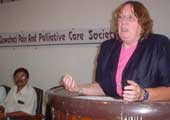 |
| Val Hunkin briefs newsmen on the objectives of the Guwahati Pain and Palliative Care Society. Picture by UB Photos |
Nov. 4: A city-based organisation is on a mission to create awareness on “learning to live with cancer”.
The Guwahati Pain and Palliative Care Society (GPPCS) will organise a public oration by Val Hunkin from the Oxford International Collaborating Centre for Palliative Care, England, on Living with Cancer at the Vivekananda Kendra on Friday.
Hunkin is one of the pioneers of the worldwide movement for palliative care. She is trying to propagate the idea of pain relief for terminally-ill cancer patients by setting up a hospice which would provide both hospital and domiciliary care.
The society, set up three years ago, is an international partner of the Oxford International Collaborating Centre for Palliative Care. The doctors and volunteers of the society also attend the pain clinic at B. Borooah Cancer Institute in the city. It has till date helped 4,950 cancer patients to overcome their pain and lead a normal life.
D.C. Goswami, secretary of the society, said: “We will try to generate awareness about the physical and mental problems faced by cancer patients. We will try to deal with the aspect of pain suffered by terminally-ill patients.
“We will also try to include patients suffering from other diseases like AIDS and rheumatism in the days to come.
“Living with cancer can be an extremely traumatic experience, particularly when the disease turns incurable. There is psychological death even before the physical death of the patient.”
“Pain management” was also the thrust of the 13th two-day annual conference of the Indian Society of Anaesthesiologists (ISA), Eastern Region, held in the city recently.
“In today’s medical world, the anaesthesiologists are playing divergent roles in patient-care, contrary to the common belief that we are responsible for only making patients unconscious during surgery,” said A.K. Deka, head of the department of anaesthesiology, Gauhati Medical College and Hospital (GMCH). Deka is also in charge of the intensive care unit at the hospital.
At present, anaesthetists have taken over post-operative pain management from the surgeons and also supplement fluids and nutrition. “We try to provide continuous and sustained pain relief to the patients and, thereby, prevent many complications that may arise due to pain,” added Deka.
Today, anaesthesiologists are responsible for the treatment of critically-ill patients in intensive care units where they provide all types of support to vital organs. “We provide relief to both acute and chronic pain and palliative care in cancer pain. We also play an important role in trauma management. We are the front liners in the resuscitation of cardio-pulmonary arrest,” said Deka.











